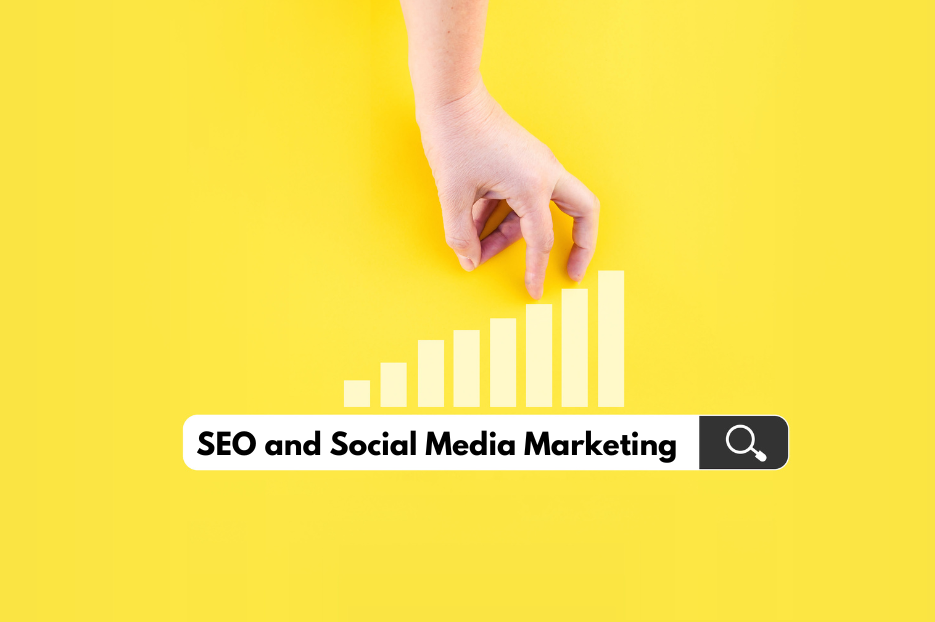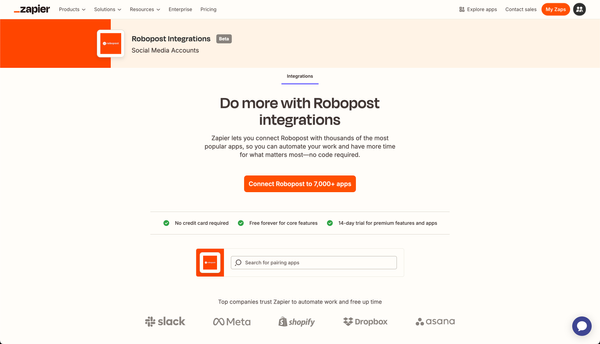The Intersection of SEO and Social Media Marketing
Explore the synergy between SEO & social media for marketing success in our insightful article.

In digital marketing, the connection between SEO and social media marketing has become very important. This article looks at how to combine SEO and social media strategies to get more visibility and engagement online. We'll talk about optimizing social profiles, using social platforms effectively, understanding how AI affects things, measuring success, and avoiding common mistakes, all of which can have a big impact on how visible your brand is online.
Key Takeaways
- Make sure your social media profiles have the right keywords and eye-catching visuals to boost SEO and strengthen your brand's image.
- Sharing top-notch, SEO-friendly content on social media can increase your audience and might even bump up your search rankings.
- AI is changing how we approach SEO and social media, making content better and helping us understand social cues more efficiently.
- To succeed in marketing, avoid mistakes like using the wrong keywords, not engaging enough with users, and not coordinating your content effectively.
Optimizing Social Media Profiles for Enhanced SEO

Aligning Brand Identity with SEO Goals
Aligning your brand with SEO means making sure your online presence works for both people and search engines. This involves creating a consistent brand message that includes keywords without losing your brand's personality and values.
- Research keywords that matter to your brand and audience.
- Use these keywords naturally across all your online platforms.
- Keep your messaging, visuals, and user experience consistent to strengthen brand recognition.
When your brand identity matches your SEO goals, you'll appeal to both people and search engines, leading to better visibility and engagement. The aim isn't just to rank high in searches but to be a brand that's real, reliable, and memorable. This approach can make the difference in getting noticed and chosen by potential customers.
Incorporating Keywords into Social Profiles
Using keywords strategically is key to being found in social media. Just like in traditional SEO, placing keywords in your social profiles can boost how easily your brand is found. Once you find the most relevant keywords for your brand and industry, then:
- Naturally add these keywords to your profile bio, description, and posts.
- Use keywords in hashtags to reach more people.
By weaving keywords throughout your social media presence, you create a story that search engines can understand and rank well.
DO NOT overdo it with keywords. Use them wisely to reflect your brand's message and values. This not only helps with SEO but also connects you with the right audience.
Utilizing Visuals to Boost Brand and SEO
Visual content like images, videos, and infographics is crucial for boosting brand recognition and SEO. These visuals not only make your social media profiles more interesting but also help with SEO by keeping users on your page longer, which search engines like.
Here's how to optimize visual content for SEO:
- Name image files with relevant keywords.
- Use alt text to describe images for better SEO.
- Include branded visuals to reinforce your brand identity.
- Use infographics to explain complex information.
Make sure your visuals match your brand's look and feel for a consistent user experience across platforms. By using visuals strategically, you can improve your brand's SEO and create a memorable online presence.
Leveraging Social Platforms to Amplify Content Reach
Creating High-Quality, SEO-Optimized Content
Creating content that connects with your audience and search engines is a mix of creativity and strategy. Quality content that's optimized for SEO is key for a successful digital marketing plan, boosting engagement and visibility in searches.
Here's how to do it:
- Use relevant keywords naturally in your content.
- Structure your content with clear headings and subheadings.
- Include links to trustworthy sources.
- Make your content easy to share and engage with.
The aim is to offer value to your audience while showing search engines that your content is relevant and valuable.
Avoid going overboard with SEO to the point that it affects readability. Focus on seamlessly integrating SEO techniques that improve the user experience rather than detract from it.
Utilizing Social Shares to Influence Search Rankings
The connection between social media and SEO is clear when we think about how social shares affect search rankings. Likes, shares, and comments on social media indicate how good and relevant your content is, which affects how search engines rank your site.
- Add share buttons to your content pages to encourage people to share your posts, and put these buttons where they're easy to see and use.
- Interact with your followers on social media to build a community that shares your content.
When more people share your content on social media, it gets seen by more people and might rank better in search results. Search engines see lots of shares as a sign that your content is trustworthy and valuable.
But remember, social shares aren't the only thing that matters for SEO. A strong SEO strategy also includes getting good links to your site and making sure your website content and titles are optimized.
Understanding the Impact of AI on SEO and Social Media Strategies

How AI is Shaping Social Media Engagement
AI is changing how businesses use social media. AI-powered personalization creates content that fits each user's preferences. This makes the user experience better and increases the chances of content being shared, reaching more people.
AI tools are now important for planning when to post content. Platforms like Robopost can help you to schedule your posts. AI also helps with SEO by understanding how users search and engage with content online.
Using AI can make social media campaigns more authentic and creative. AI and human creativity together create better content that gets people engaged.
In short, AI is changing how businesses use social media, and being flexible in this AI-driven world is important for success.
AI-Driven Content Optimization for Better Rankings
Embracing AI in content optimization has changed how we do SEO. AI tools are essential for improving keyword use, making sure content fits what users want, and matching search engine rules. These tools go through lots of data to find the best keywords and phrases, considering what users look for and current trends.
AI in SEO also makes content more relevant. It checks content quality and how well it matches what users search for, giving suggestions on keywords, structure, and how to optimize to rank higher.
Having an SEO strategy based on data is vital now. AI looks at search numbers, how users act, and what competitors do, helping businesses make content that's seen more. Here's a summary of AI's benefits in content optimization:
Benefit | Description |
|---|---|
Enhanced Keyword Optimization | AI refines keyword strategies through data analysis. |
Content Relevance | Tools ensure content fits what users want. |
Data-driven Insights | AI gives suggestions based on detailed data analysis. |
Using AI for content optimization can boost SEO, getting better rankings and more online visibility.
Analyzing Social Media Metrics to Inform SEO Decisions
Understanding how social media metrics affect SEO is vital for improving your online strategy. When you study engagement and reach on social media, you can spot trends that help with SEO. For example, lots of shares on a post might mean that topic is popular, which you can use for SEO by targeting related keywords.
Social media metrics give you lots of data that, when you understand it, can really help your SEO. Here are some important metrics to keep an eye on:
- Engagement: How many likes, comments, shares, and clicks your content gets.
- Reach: How many people see your posts.
- Conversion: How often social media interactions lead to actions on your website.
Checking these metrics regularly helps you see what content works best and adjust your SEO and content marketing strategies.
Social media impacts SEO because it shows search engines how relevant and authoritative your content is. By watching and understanding these metrics, you can use social signals to boost your brand's marketing and search rankings.
Common Pitfalls to Avoid in SEO and Social Media Marketing

Missteps in Keyword Usage on Social Platforms
In social media marketing, using the right keywords is key to reaching your audience. But using them wrong can hurt your visibility and engagement. One common mistake is using too many irrelevant or unnecessary hashtags, which can annoy followers and even get flagged as spam, making your posts less visible.
- Use hashtags that are relevant to your content to help people find it.
- Don't use too many popular hashtags that don't fit your post.
- Make sure your captions have keywords but also sound natural and interesting.
It's important to find a balance between using keywords for SEO and keeping your social media posts engaging. Going too far with keywords can be just as bad as ignoring SEO altogether.
Another mistake is not considering how keywords fit into your overall message. Keywords should fit naturally into your posts, adding to the conversation instead of feeling out of place. Social media platforms care about real interactions, so forcing keywords can make your posts feel less genuine.
Overlooking the Importance of User Engagement
Engaging with your audience on social media goes beyond just gaining followers; it's about creating a community around your brand. User engagement is crucial and can have a big impact on your SEO efforts. It's important to know that search engines now recognize and value real interactions.
- Keep track of engagement metrics like likes, shares, comments, and click-through rates.
- Study how your content performs to see what your audience likes.
- Adjust your content strategy to encourage more meaningful interactions.
By forming real connections with your audience, you not only boost your brand's presence but also improve your SEO rankings.
Social media engagement is now a key part of marketing strategies, as platforms reward genuine interactions. This shift highlights the importance of not just being on social media but actively engaging in conversations and building communities.
Neglecting the Synergy Between SEO and Social Media Content
By combining SEO practices with social media, businesses can improve their online presence and attract more visitors to their websites.
- Optimize social media profiles with relevant keywords related to your brand.
- Create content that is both useful and optimized for search engines.
- Engage with your followers actively to increase visibility and website traffic.
Not leveraging this connection can lead to missed opportunities for higher visibility and engagement. It's important to recognize that social media can expand the reach of SEO-friendly content, benefiting both SEO and social media efforts.
To avoid missing out, follow these steps:
- Make sure your social media profiles reflect your SEO objectives.
- Share content that is engaging and optimized for SEO.
- Use social media to promote your SEO-focused content, improving your overall digital marketing strategy.
Conclusion
In digital marketing, the close relationship between SEO and social media marketing is crucial for success. As we've discussed in this article, social media's wide reach and impact can greatly improve SEO by bringing in traffic, making brands more visible, and adding to the social cues that search engines consider for rankings. To make the most of this, businesses should optimize their social media profiles, produce top-notch content with relevant keywords, and actively engage with their audiences. However, it's essential to track the results of these efforts and adjust to changes in algorithms and consumer behaviors. Ultimately, blending SEO and social media marketing is about creating a unified and lively online presence that appeals to both search engines and real people using them.
